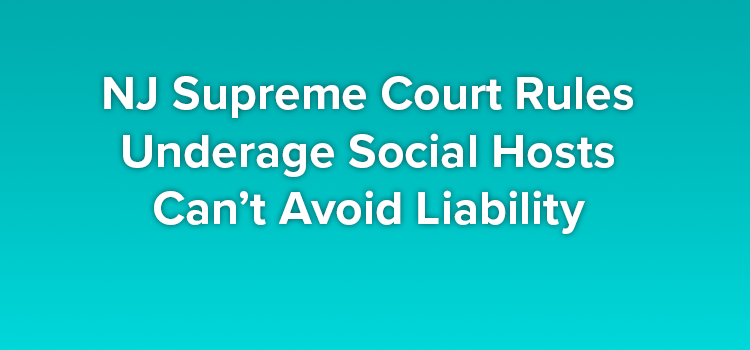In Estate of Brandon Tyler Narleski v. Nicholas Gomes (A-9/10-19/083169) (Decided September 17, 2020), the Supreme Court of New Jersey held that an underage adults can be held civilly liable to a drunk driving victim if they allow underage drinking in their homes, and if the guest causing the crash became visibly intoxicated in the defendant’s home, and if it was reasonably foreseeable that the visibly intoxicated guest would leave the residence to operate a motor vehicle and cause injury to another. According to the court, it doesn’t matter if the defendant owned the home or provided the alcohol.

Facts of Estate of Narleski v. Gomes
Nineteen-year-old Mark Zwierzynski permitted underage adult friends to consume alcoholic beverages in his home. Nineteen-year-old Brandon Tyler Narleski and twenty-year-old Nicholas Gomes left the home severely intoxicated. Shortly afterwards, Gomes lost control of his vehicle and crashed. Narleski died at the scene. Gomes’s blood alcohol concentration was twice the legal limit.
Narleski’s parents filed a wrongful death action against Gomes, Gomes’s parents, and Amboy Food Liquor and News (Amboy), where the underage Narleski purchased the alcohol. In turn, Amboy filed a third-party complaint against Zwierzynski. The trial court granted Zwierzynski’s motion for summary judgment, finding that he did not have a duty to supervise his friends.
The Appellate Division affirmed the dismissal of the complaint against Zwierzynski. However, it declared that, going forward, an underage adult “shall owe a common law duty to injured parties to desist from facilitating the drinking of alcohol by underage adults in his place of residence, regardless of whether he owns, rents, or manages the premises.”
NJ Supreme Court’s Decision in Estate of Narleski v. Gomes
The New Jersey Supreme Court reversed, with Justice Barry Albin writing on behalf of the court.
“We now hold that an underage adult defendant may be held civilly liable to a third-party drunk driving victim if the defendant facilitated the use of alcohol by making his home available as a venue for underage drinking, regardless of whether he is a leaseholder or titleholder of the property; if the guest causing the crash became visibly intoxicated in the defendant’s home; and if it was reasonably foreseeable that the visibly intoxicated guest would leave the residence to operate a motor vehicle and cause injury to another,” Justice Albin wrote. “An underage adult, by law, may sue and be sued, may drive a motor vehicle, and has the same civil obligations as any other citizen. He too is bound by the social compact. His age does not make him immune from legal responsibility for the violation of an established duty that is intended to protect others from foreseeable harm.”
In reaching its decision, the New Jersey Supreme Court noted that the text and legislative history of the Social Host Liability Act refute any argument that it was intended to replace or stunt the development of the common law of social host liability in cases where alcohol is provided to intoxicated minors and underage adults. Accordingly, the court rejected any interpretation of the Social Host Liability Act that would lead to the “absurd conclusion that the Legislature intended to create a liability-free zone for underage social hosts who knowingly provide alcohol to visibly intoxicated minors and underage adults who negligently cause injury to third parties as a result of their intoxication.”
The court also found that the factors for determining whether to recognize a duty to refrain from conduct that poses an unreasonable risk of foreseeable harm to others, which include the relationship of the parties, the nature of the attendant risk, the opportunity and ability to exercise care, and the public interest in the proposed solution, also supported its decision. “Weighing those factors, the Court concludes that an underage social host, who makes his residence available and facilitates underage drinking, has a duty not to knowingly provide or allow self- service of alcohol to a visibly intoxicated guest and, if a guest becomes visibly intoxicated, to take reasonable steps to prevent the guest from operating a motor vehicle,” Justice Albin wrote.
The court went on to establish that a plaintiff injured by an intoxicated underage social guest may succeed in a cause of action against an underage social host if the plaintiff can prove by a preponderance of the evidence the following: (1) The social host knowingly permitted and facilitated the consumption of alcoholic beverages to underage guests in a residence under his control. This element does not require that the social host be a leaseholder or titleholder to the property. It is enough that the social host has the ability and apparent authority to give others access to the property; (2) The social host knowingly provided alcohol to a visibly intoxicated underage guest or knowingly permitted the visibly intoxicated underage guest to serve himself or be served by others. It is no defense that the underage guests bought and brought the alcoholic beverages that they or others consumed; (3) The social host knew or reasonably should have known that the visibly intoxicated social guest would leave the premises and operate a motor vehicle and therefore would foreseeably endanger the lives and property of others; (4) The social host did not take any reasonable steps to prevent the intoxicated guest from getting behind the wheel of the vehicle; and (5) The social guest, as a result of intoxication facilitated by the social host, negligently operated a vehicle and proximately caused injury to a third party.
Finally, the New Jersey Supreme Court held that because the duty recognize by the court was foreshadowed by precedent it should apply in the case of Zwierzynski. “Applying the duty here is also consistent with the usual rule that the prevailing party who brings a claim that advances the common law should receive the benefit of his efforts,” Justice Albin explained.
